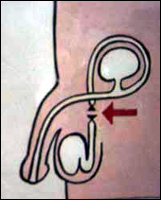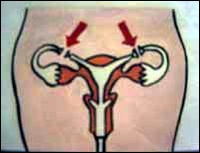Sterilization becomes most popular birth control method
In male sterilization, lethal outcomes are highly rare

If the two spouses decide not to have any children, they may sit down and think who is going to volunteer to be sterilized. It may depend on a variety of circumstances. Vasectomy, the procedure for men, is safe and simple. The operation takes only 15 minutes and requires local anesthesia. A surgeon makes a tiny cut on the scrotum and uses a special tool to cut vas deferens (tubes that carry sperm) and blocks both cut ends. A sterile man does not notice any difference in the quantity or the appearance of his semen. 
The procedure for women is more complicated. Sterilization is achieved by means of blocking fallopian tubes. A surgeon makes a small cut on the woman's stomach and uses the special tool called laparoscope to find, cut and block the fallopian tubes. The operation can be performed through vagina at times. Most frequently female sterilization is performed in 48 hours after childbirth, as it is much easier from the technical point of view.
The blocking of seminal canals and fallopian tubes is highly efficient as far as birth control methods are concerned. That is why sterilization enjoys great popularity in family couples. Vasectomy's failure rate is about 0.2percent, the tubal ligation risk is estimated at 9.5 percent.
 Female sterilization may lead to complications in one percent of cases at most. The number of lethal outcomes after voluntary surgical sterilization may happen in three cases from 100,000, which makes specialists categorize the operation as safe. The risk of abdominal pregnancy is one of the most frequent complications.
Female sterilization may lead to complications in one percent of cases at most. The number of lethal outcomes after voluntary surgical sterilization may happen in three cases from 100,000, which makes specialists categorize the operation as safe. The risk of abdominal pregnancy is one of the most frequent complications.
In male sterilization, lethal outcomes are highly rare – they may occur once in 300 thousand cases (from bleeding or an infection). Two-thirds of men develop sperm antibodies after the operation, but specialists have never documented their negative influence on health. It is known, however, that a woman will be protected against uterine cervix cancer, if her husband undergoes the vasectomy operation.
Sterilization is a process that cannot be reversed. That is why doctors always ask the two spouses to think it through before making the final decision. It is possible to unblock the cut canals and tubes, but the reproductive function might not be retrieved completely. In addition, it is a much more complicated microsurgical operation, which requires the general anesthesia. It is a lot riskier than sterilization.
Some men and women regret the decision afterwards. Specialists for the Healthcare Center in Moscow suggest the following questions, which might help a family couple make a decision on sterilization.
Do you feel any social pressure in connection with the decision? A research revealed that women, who succumb to peer pressure, might regret the decision later. Do you think that your family is big enough? Specialists believe that the smaller the family, the more confidence a woman obtains when she thinks that her decision to undergo the sterilization process was correct. If a woman thinks that having two children is not enough for the perfect family, she might have mixed feelings on the matter. Did it take you long to make the decision, or was it spontaneous? Doctors determined that the more people think about such a decision, the more confidence they will have after the operation. If a spouse makes the decision single-handedly, the other spouse will definitely be left dissatisfied and even depressed.
Subscribe to Pravda.Ru Telegram channel, Facebook, RSS!


